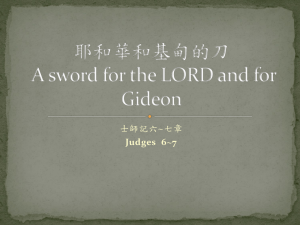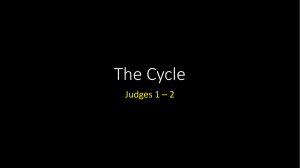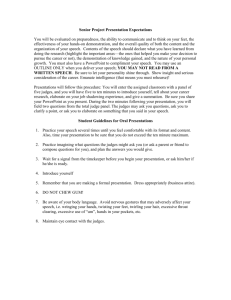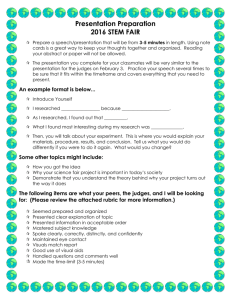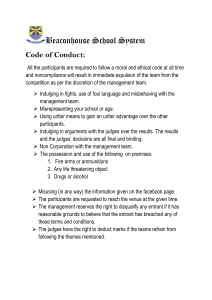Robert Vannoy, Exodus to Exile, Lecture 8B
advertisement
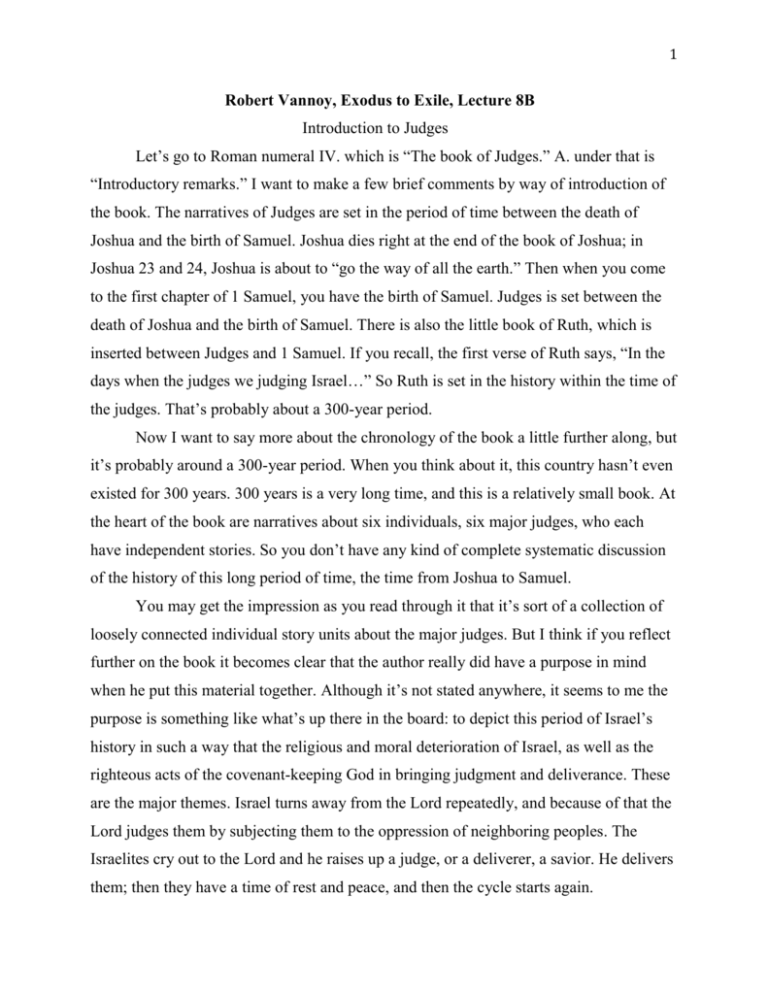
1 Robert Vannoy, Exodus to Exile, Lecture 8B Introduction to Judges Let’s go to Roman numeral IV. which is “The book of Judges.” A. under that is “Introductory remarks.” I want to make a few brief comments by way of introduction of the book. The narratives of Judges are set in the period of time between the death of Joshua and the birth of Samuel. Joshua dies right at the end of the book of Joshua; in Joshua 23 and 24, Joshua is about to “go the way of all the earth.” Then when you come to the first chapter of 1 Samuel, you have the birth of Samuel. Judges is set between the death of Joshua and the birth of Samuel. There is also the little book of Ruth, which is inserted between Judges and 1 Samuel. If you recall, the first verse of Ruth says, “In the days when the judges we judging Israel…” So Ruth is set in the history within the time of the judges. That’s probably about a 300-year period. Now I want to say more about the chronology of the book a little further along, but it’s probably around a 300-year period. When you think about it, this country hasn’t even existed for 300 years. 300 years is a very long time, and this is a relatively small book. At the heart of the book are narratives about six individuals, six major judges, who each have independent stories. So you don’t have any kind of complete systematic discussion of the history of this long period of time, the time from Joshua to Samuel. You may get the impression as you read through it that it’s sort of a collection of loosely connected individual story units about the major judges. But I think if you reflect further on the book it becomes clear that the author really did have a purpose in mind when he put this material together. Although it’s not stated anywhere, it seems to me the purpose is something like what’s up there in the board: to depict this period of Israel’s history in such a way that the religious and moral deterioration of Israel, as well as the righteous acts of the covenant-keeping God in bringing judgment and deliverance. These are the major themes. Israel turns away from the Lord repeatedly, and because of that the Lord judges them by subjecting them to the oppression of neighboring peoples. The Israelites cry out to the Lord and he raises up a judge, or a deliverer, a savior. He delivers them; then they have a time of rest and peace, and then the cycle starts again. 2 So I think you have this period of Israel’s history depicted in a way that brings those ideas out: you see the religious moral deterioration of Israel on one hand, but then you see the righteous acts of the covenant-keeping God in bringing both judgment and deliverance—essentially following the provisions of the Sinai covenant in blessings and curses, and working it out in the life of the people. With that in mind, I think you see the following emphasis of the book. The book emphasizes Israel’s inner weakness in turning away from Yahweh, falling under the influence of the heathen religious and moral practice of the Canaanites. Dan Block wrote the commentary in the New American Commentary Series on Judges and Ruth (which is fairly recent, published in 1999). I think it is probably the best commentary on Judges. He speaks of the Canaanization of Israel in the pre-monarchic period as being what is described in the book of Judges. Israel turns away from the Lord and begins to follow the practices of the Canaanites. Now, we can be pretty critical of the Israelites. Here is a people that was delivered from Egypt, brought into the land of Canaan, crosses the Jordan in an equally miraculous manner, and takes Jericho and the waters of Merom. However, Israel settles down, and in doing so comes into close and extended contact with the Canaanites. Canaanite religion was polytheistic and it was a nature religion. The deities of the Canaanites were personalized forces of nature with particular emphasis on the idea of fertility. The Israelites came in and settled on this land, and instead of being wanderers in the wilderness, they had to become farmers all of a sudden. They had to raise crops and maintain cattle. The farmers had to know when and how to plow the ground and sow the seed, how to harvest the crops, and how to do that in the right time in the right way. It would be natural for the Canaanites to be their instructors. But the Canaanites undoubtedly would emphasize the necessity of honoring the gods who gave them rain, provided the harvest, and increased fertility. Rituals and festivals in observance of these Canaanite deities would be necessary or they would not have productive crops. You come on new ground—you must worship the god of that territory. The common concept was of a territorial deity. So to follow that kind of logic, 3 you can understand that the Israelite would be led into some syncretism to combine Baal worship with the worship of Yahweh. I think that’s what is described in the book of Judges. They did settle down with them, they did intermarry with them and they did worship Canaanite deities. The problem Israel faced was that they did not maintain this fundamental antithesis between the way of life of the Israelites and the way of life of the Canaanites. It was Israel’s obligation to maintain that antithesis. They were to be different; they were to be a kingdom of priests and a holy nation. God had a plan for them; they were to be separate and apart to this day. Instead they blurred that line of antithesis and settled down with these people. That same problem comes back to us in a different form today. Today the antithesis is between the church and the world. How do you keep that sorted out? How do you preserve the differences between a godly way of life, and the way of life of the culture in which you live? These lines are sometimes not easy to draw, but it’s the same issue. Israel confused and blurred these lines, and as a result they turned away from the Lord into syncretistic worship. So the emphasis is on Israel’s weaknesses, falling under the influence of pagan religions and moral practices of the Canaanites. The second emphasis is the depiction of a chaotic social condition that led to the desire for a king. As the people turned away from the Lord and covenant faithfulness, you find that the result was religious chaos. You come to the end of the book and you have private sanctuaries and that murder of a concubine in later chapters. It’s in those later chapters of the book that you come across the phrase, “Every man did what was right in his own eyes.” Then a couple times you have that phrase repeated and associated with “There is no king in Israel, everybody did what was right in their own eyes.” Conditions became such that it seemed like there needed to be some kind of central authority in order to prevent the country from this disintegrated religious law of code. You find that statement at the end of the book in Judges 17:6: “In those days Israel had no king. Everyone did as he saw fit.” Judges 18:1: “In those days Israel had no king.” Judges 19:1: “In those days Israel had no king.” And in Judges 21:25, the last verse of the book: “In those days Israel had no king, everyone did as they saw fit.” So chaotic social 4 conditions developed, and that led to a desire for a king which ultimately runs over into 1 Samuel, the establishment of kingship. A third emphasis is the the gracious non-merited intervention of the covenantkeeping God in spite of Israel’s repeated disobedience. The Lord responded in gracious and merciful ways by delivering them repeatedly, time after time after time—and not because Israel merited that deliverance. Look at Judges 6:7 and following: “When the Israelites cried to the Lord because of Midian, he sent them a prophet and he said to them, ‘This is what God the Lord of Israel says…’” Here you get a small microcosm of the covenant form: “‘I brought you out of Egypt [here’s what I have done for you], out of the land of slavery; I snatched you from the power of Egypt, from the hand of all your oppressors. I drove them from before you and gave you their land. I said to you, “I am the Lord your God. Do not worship the gods of the Amorites in whose land you live [here’s all the things I’ve done], but you have not listened to me.”’” In Judges 10:11 and following, we read: “The LORD replied, ‘When the Egyptians, the Amorites, the Ammonites, the Philistines, the Sidonians, the Amalekites and the Maonites oppressed you and you cried to me for help, did I not save you from their hands? [Here’s what I have done, yet did you turn to me?] But you have forsaken me and served other gods, so I will no longer save you. Go and cry out to the gods you have chosen. Let them save you when you are in trouble!’” But the Lord does relent. They cry out to the Lord and he does deliver them. So he shares mercy and judgment, he gives repeated opportunity for repentance; he does not utterly destroy them or wipe them out or exile them from the land, as he would have had all the right to do. There’s an interesting text in 2 Kings 13:23, in a much later time of the Old Testament period, the time of Jehoash king of Israel. You read in 2 Kings 13:22, “Hazael king of Aram oppressed Israel throughout the reign of Jehoahaz.” Then there’s verse 23: “But the LORD was gracious to them and had compassion and showed concern for them [why?], because of his covenant with Abraham, Isaac, and Jacob. To this day he has been unwilling to destroy them or banish them from his presence.” That’s an interesting statement because it is as if he says, “You know my patience is not going to last forever. 5 But up to this point, I have been unwilling to banish you from my presence, to drive you out of the land.” That was the climax of the covenant curses. If you go back to Deuteronomy 28, you’ll see those curses listed—drought, infertility, locusts, and plagues. The climax is, “If you persist in disobedience, one day you will be driven out of the land that I have given you.” And here in the time of Jehoahaz—“Until now, I have been unwilling to do that.” If you go back to the time of the Judges, he repeatedly delivered them and did not drive them from the land. So he is faithful to the covenant that he made with Abraham, Isaac, and repeated to Jacob. He does not abandon his people. Look at Psalm 106, which gives a summary of this period of Israel’s history. Beginning in verse 34, the psalmist says of Israel, “They did not destroy the peoples as the LORD had commanded them, but they mingled with the nations and adopted their customs. They worshiped their idols, which became a snare to them. They sacrificed their sons and their daughters to demons. They shed innocent blood, the blood of their sons and daughters, whom they sacrificed to the idols of Canaan, and the land was desecrated by their blood. They defiled themselves by what they did; by their deeds they prostituted themselves. Therefore the LORD was angry with his people and abhorred his inheritance. He handed them over to the nations, and their foes ruled over them. Their enemies oppressed them and subjected them to their power.” Then notice verse 43: “Many times he delivered them, but they were bent on rebellion and they wasted away in their sin. But he took note of their distress when he heard their cry; for their sake he remembered his covenant and out of his great love he relented.” So that’s the picture of this period. The Lord is gracious and faithful in spite of their disobedience. In Nehemiah 9:27 there’s another summary of this period of time. Nehemiah says in his prayer, “So you handed them over to their enemies, who oppressed them. But when they were oppressed they cried out to you. From heaven you heard them, and in your great compassion you gave them deliverers, who rescued them from the hand of their enemies. But as soon as they were at rest, they again did what was evil in your sight. Then you abandoned them to the hand of their enemies so that they ruled over them. And when they cried out to you again, you heard from heaven, and in your compassion you 6 delivered them time after time. You warned them to return to your law, but they became arrogant and disobeyed your commands. They sinned against your ordinances, by which a man will live if he obeys them. Stubbornly they turned their backs on you, became stiffnecked and refused to listen.” Notice verse 30: “For many years you were patient with them. By your Spirit you admonished them through your prophets. Yet they paid no attention, so you handed them over to the neighboring peoples. But in your great mercy you did not put an end to them or abandon them, for you are a gracious and merciful God. Now therefore, O our God, the great, mighty and awesome God, who keeps his covenant of love…” So that’s the picture we get here of the book of Judges. B. on your outline is “Content: a survey of the book.” There are a fairly large number of chronological references in the book of Judges. If you go through the book and trace all the chronological data, it does create a rather complex chronological problem. So in this chart and the next one there’s a listing of the periods of oppressions with the years of each. So you have the Mesopotamian oppression of 8 years, and then Othniel’s deliverance which lasted 40 years. The Moabite oppression lasted 18, and the deliverance lasted 80. And it goes down through the first nine chapters. Then if you go further you have additional references to the years of judgeships and oppressions. If you list all of them out, as on those two pages, and then add them up, you get a total of 410 years. Now, the question is, how much does that 410 years have to be compressed? In other words, how might these periods of regional conflict overlap each other? Here’s where you get back into the question of the date of the Exodus—whether to favor the early date or the late date. We have already discussed that at some length. One of my reasons for favoring an early date is because it is easier to harmonize with the chronology of the book of Judges. If you take a late date for the Exodus, approximately 1290, then 40 years later you have the conquest about 1250 B.C. So the conquest is 1250, and we know that the period of Solomon is 966 B.C. If you subtract 966 from 1250, you have a gap of 284 years. We also know that you have to add in to that to get to the fourth year of Solomon after the period of the judges, the time from Eli to Solomon. Eli about 20 years, Samuel 40, David 53 and Solomon 4, and you get another 117 years. That means from 7 Joshua until the end of Judges we only have 167 years. That means you have to compress that 410 down into 167 years. Now if you take an early date of the Exodus, 1446 B.C., the conquest would be in 1406. (That 1446 comes from 480 years earlier than Solomon from 1 Kings 6:1.) So the conquest is 1406 and the fourth year of Solomon is 966. That is 440 years, and you have to take out Eli to Solomon—that’s 117 years—and then you get 323 years. The 410 has to go back down to 323 as compared to 410 going down to 167. You can see that it’s easier to compress your chronological data of Judges into 323 years than it is to compress it into 167 years. I don’t want to discuss that much further, but let me just mention on your bibliography—page 13, I believe—under this heading IV. B. there is an article by Andrew Steinman, “The mysterious numbers of the book of Judges” published in the Journal of the Evangelical Theological Society. It is quite recent, 2005, and it has the details of this if you are interested. I think you can say that compression of chronology in Judges is in keeping with the content of the book. When you read through the book, it seems that a rather small portion of the country was affected by the oppressions. In other words, they were regional oppressions, so they could have overlapped. Almost any two judges may have been active at least partially during the same period. Let’s go on to C. then: “The ancient Near Eastern situation from 1200 to 1050 B.C.” If you go back to the Egyptian dynasties, you notice that after Merneptah in 1222 B.C., you get a period of confusion, and then with Rameses III and Rameses IV-XI they are in a period of weakness. So shortly after that late date of Exodus, Egypt lost control of their holdings outside of Egypt. Egypt had to defend her frontiers, you might say. They retreated into their own country and were not concerned with controlling territory outside their borders. They also had to deal with attacks from what were called the “sea people,” who were people that came from the isle of Crete and attacked Egypt. That’s around 1200, and some think they were the Philistines who were around Gaza. At any rate, the point is that Egypt ceased to be a major power. When you go up to the north, the Hittite empire was strong from about 1900 down 8 to 1200 B.C. But it also collapsed. It collapsed from western enemies who came from the western areas of Asia Minor. We talked earlier about Rameses II who had fought the Hittites up on the Orontes River. They came to a standoff and signed a nonaggression pact and there was a treaty. That was in 1280 B.C. So in 1280 the Hittites and Egyptians were still struggling for control for Levant—the coast of the Mediterranean. But by 1200 the Hittites are gone, and Egypt is back in their own territory. When you go over to Mesopotamia about 1200 B.C., Assyria entered the period of weakness. Closer up in Damascus and Carchemish, there are small city-states. All of this tells us that in this period of time Israel is free from any major world power: the Egyptians were weak, the Hittites had disappeared, and the Assyrians were weak. When you read through the book of Judges, you find that they are concerned with small local border states—the Moabites, the Midianites, the Ammonites, and the Philistines—not with major world powers. The Philistines really had become the next major threat to Israel, especially by the end of the period of Judges. There’s Samson, who was beginning to fight the Philistines, and that carries on over into 1 Samuel where the Philistines become even more threatening to Israel. So that’s the situation from 1200 down to about 1050 B.C. D. is “Structure and content of Judges,” and 1. under D. is “The Historical background discussed further in the book of Judges 1:1 to 2:5.” After Joshua’s death it was a responsibility of each tribe to complete the conquest of their own territories that Joshua had assigned to them. What Judges 1:1 to 2:5 does is give an overview of the military operations of a number of the tribes. You’ll find that they didn’t finish the job; they didn’t do what they were supposed to do. For example, you read in Judges 1:27, “But Manasseh did not drive out the people of Beth Shan or Taanach or Dor or Ibleam or Megiddo and their surrounding settlements, for the Canaanites were determined to live in that land.” Verse 29, “Nor did Ephraim drive out the Canaanites living in Gezer, but the Canaanites continued to live there among them.” Verse 30, “Neither did Zebulun drive out the Canaanites living in Kitron or Nahalol, who remained among them; but they did subject them to forced labor.” Verse 31, “Nor did Asher drive out those living in Acco or 9 Sidon.” Verse 33, “Neither did Naphtali drive out those living in Beth Shemesh…” So Israel failed to live up to what they had been commanded to do, and the result is described in the first five verses of chapter 2. Here you get the microcosm of the covenant form again. You read there, “The angel of the LORD went up from Gilgal to Bokim and said, ‘I brought you up out of Egypt and led you into the land that I swore to give to your forefathers. I said, “I will never break my covenant with you, and you shall not make a covenant with the people of this land, but you shall break down their altars.” Yet you have disobeyed me. [Here’s what I’ve done, what have you done?] Why have you done this? Now therefore I tell you that I will not drive them out before you; they will be thorns in your sides and their gods will be a snare to you.’ When the angel of the LORD had spoken these things to all the Israelites, the people wept aloud, and they called that place Bokim [meaning “weepers”]. There they offered sacrifices to the LORD.” I think that explains to a large extent the course of events described in the rest of the book. They settled down with the Canaanites and they turned away from the Lord, and the result is what you find in the rest of the book. So in Judges 1:1 to 2:5 you get the historical background to the period that the book of Judges describes. 2. under D. is “The theological basis for a proper understanding of the book of Judges: Judges 2:6 to 3:4.” Judges 2:6 to 3:4 is sometimes called the “second introduction.” If you look at the structure of the book, you find two introductions—the historical background and the theological background. At the end of the book you get two conclusions—you get those two stories of religious and moral deterioration. So structurally the book is book-ended by two introductions and two conclusions, and in the middle you get the stories of the six major judges. So this is sometimes called the second introduction, and it picks up from Joshua 24:28-41. Now what I mean by that is, if you go back to Joshua 24, which was the covenant renewal at Shechem, you read in verse 28 at the end of that ceremony at Shechem, “Then Joshua sent the people away, each to his own inheritance. After these things, Joshua son of Nun, the servant of the LORD, died at the age of a hundred and ten. And they buried him in the land of his inheritance, at Timnath Serah in the hill country of 10 Ephraim, north of Mount Gaash. Israel served the LORD throughout the lifetime of Joshua and of the elders who outlived him and who had experienced everything the LORD had done for Israel.” Now go back to Judges 2:6. Notice how that begins the same way as Joshua 24:28, “After Joshua had dismissed the Israelites, they went to take possession of the land, each to his own inheritance. The people served the LORD throughout the lifetime of Joshua and of the elders who outlived him and who had seen all the great things the LORD had done for Israel. Joshua son of Nun, the servant of the LORD, died at the age of a hundred and ten. And they buried him in the land of his inheritance, at Timnath Heres in the hill country of Ephraim, north of Mount Gaash. After that whole generation had been gathered to their fathers, another generation grew up, who knew neither the LORD nor what he had done for Israel. Then the Israelites did evil in the eyes of the Lord…” This connects right in with the end of the book of Joshua and then it carries the story forward. The writer of Joshua explains that the tendency of unfaithfulness is due to the rise of a new generation—that’s in Judges 2:10. They had not witnessed the great acts of the Lord at the time of the conquest: “After that whole generation was gathered to their fathers, another generation grew up and did know Yahweh and the things he did for them.” Verse 12, “They forsook the Lord, the God of their fathers, who brought them out of Egypt. They worshiped various gods from the people surrounding them.” Because they turned away from the Lord and worshiped other gods, the Lord turned them over to oppression in the hands of other people. Then you read in Judges 2:13, “They forsook him and served Baal and the Ashtoreths. In his anger against Israel the LORD handed them over to raiders who plundered them. He sold them to their enemies all around, whom they were no longer able to resist. Whenever Israel went out to fight, the hand of the LORD was against them to defeat them, just as he had sworn to them. They were in great distress.” Then, verse 16, “The LORD raised up judges who saved them out of the hands of these raiders.” But then you read that they quickly turned away from the way their fathers had walked in obedience. Verse 18 says, “Whenever the LORD raised up a judge for them, he 11 was with the judge and saved them out of the hands of their enemies as long as the judge lived; for the LORD had compassion on them as they groaned under those who oppressed and afflicted them. But when the judge died, the people returned to ways even more corrupt than those of their fathers, following other gods and serving and worshiping them.” So you get this cycle of turning away from the Lord, oppression, some say repentance, and then deliverance. You notice it doesn’t say anything about repentance in this introduction. That is certainly how the cycle is here: sin, oppression, perhaps repentance (at least crying out for help), and then deliverance. That’s again the pattern outlined in advance in the book of Deuteronomy. Here you see the actualization, you might say, of what the Lord had said would happen. As you get into historical studies it is often said that Herodotus was the father of history. What is meant by that is that Herodotus, who lived about 484-425 B.C., was much later than the Old Testament. It is often claimed that there was no true history around before Herodotus; you had only chronicles of kings’ accomplishments and annals of wars, but no true history-writing in the sense that events are put into the context of some larger meaning in the flow of history. But I think when you look at the books of Judges and Joshua, you can say there’s a real philosophy of history to be found in these books. We are nearly a millennium prior to the time of Herodotus. The history collected into the book of Judges is one that is grounded in the book of Deuteronomy and in the theology of Deuteronomy. In that sense, you can say that the books of Joshua and Judges are theological history, but not in the sense that history has been compressed or dictated by a theological scheme or falsely created by that theological scheme. This is an actual reflection of how things were. God was working his purposes in the life of his people in accordance with the provisions of the book of Deuteronomy. If they were obedient they would enjoy blessing, and if they were disobedient they would experience the curse. So I think you can say in these historical books including Joshua and Judges there is a prophetic interpretation of the meaning of the events of this period that is produced by what is called the “covenant historian”—a historian who is familiar with the covenant 12 and is describing Israel’s history in the category that document. You might call that writer a “Deuteronomy historian.” As I mentioned earlier, I don’t like to use the “Deuteronomistic historian” label because it is tied to that Deuteronomistic history concept of Martin Noth—that is, an exilic author of Joshua to Kings. He sees this as a historian living in the time of the Exile who fits all of Israel’s history into the categories of the theology of Deuteronomy. I don’t want to affirm that approach. It’s obvious that the book of Judges fits well with the theology of the book of Deuteronomy. But as we discussed before, Deuteronomy should be situated in the time of Moses as it claims to be, and as the basis for these later books—Joshua and Judges in this case. But here you have a theological basis for understanding what follows in the book of Judges. Well, we’re out of time, so we’ll pick up from there next time. Transcribed by Andre Santos Rough edited by Ted Hildebrandt Final edit by Elizabeth Fisher Re-narrated by Ted Hildebrandt

